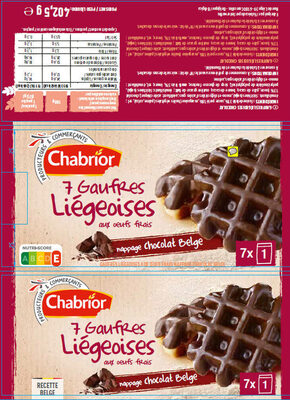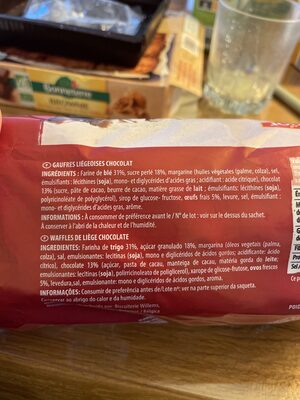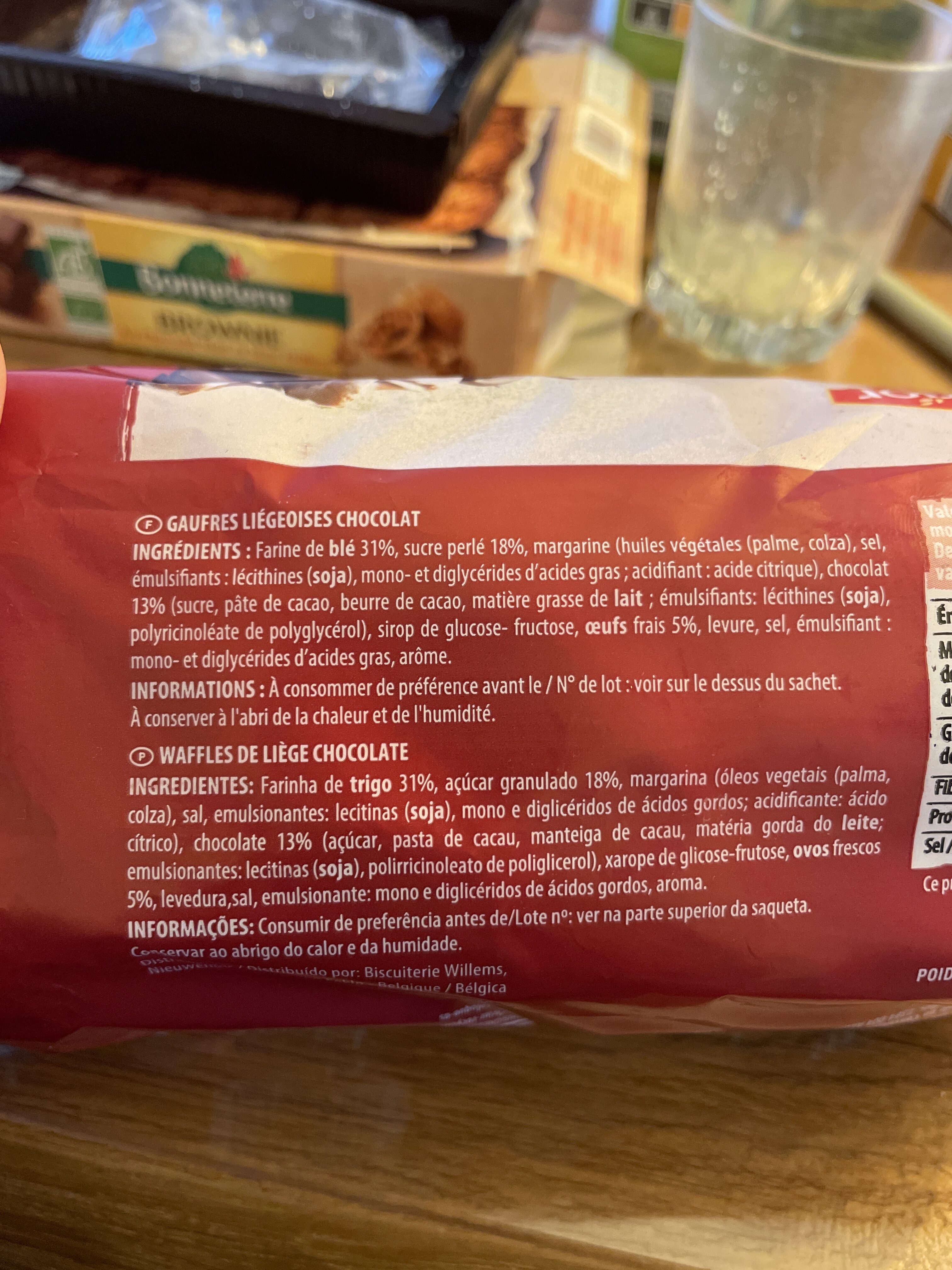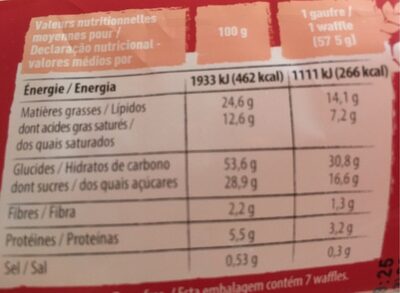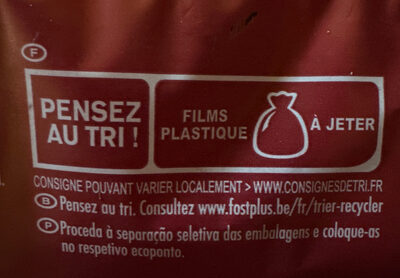Help us make food transparency the norm!
As a non-profit organization, we depend on your donations to continue informing consumers around the world about what they eat.
The food revolution starts with you!
Gaufres Liégeoises nappage chocolat belge - Chabrior - 402,5g
Gaufres Liégeoises nappage chocolat belge - Chabrior - 402,5g
This product page is not complete. You can help to complete it by editing it and adding more data from the photos we have, or by taking more photos using the app for Android or iPhone/iPad. Thank you!
×
Barcode: 3250392806958 (EAN / EAN-13)
Quantity: 402,5g
Brands: Chabrior
Categories: Snacks, Sweet snacks, Frozen foods, Biscuits and cakes, Pastries, Waffles, Plain Brussels-style soft waffle
Labels, certifications, awards: Nutriscore, Nutriscore Grade E
Stores: Intermarché
Countries where sold: France
Matching with your preferences
Health
Ingredients
-
26 ingredients
French: Farine de blé 31%, sucre perlé 18%, margarine (huiles végétales (palme, colza), sel, émulsifiants: lécithines (soja), mono - et diglycérides d'acides gras; acidifiant: acide citrique), chocolat 13% (sucre, pâte de cacao, beurre de cacao, matière grasse de lait ; émulsifiants: lécithines (soja), polyricinoléate de polyglycérol), sirop de glucose - fructose, œufs frais 5%, levure, sel, émulsifiant : mono - et diglycérides d'acides gras, arôme.Allergens: Eggs, Gluten, Soybeans
Food processing
-
Ultra processed foods
Elements that indicate the product is in the 4 - Ultra processed food and drink products group:
- Additive: E322 - Lecithins
- Additive: E471 - Mono- and diglycerides of fatty acids
- Additive: E476 - Polyglycerol polyricinoleate
- Ingredient: Emulsifier
- Ingredient: Flavouring
- Ingredient: Glucose
Food products are classified into 4 groups according to their degree of processing:
- Unprocessed or minimally processed foods
- Processed culinary ingredients
- Processed foods
- Ultra processed foods
The determination of the group is based on the category of the product and on the ingredients it contains.
Additives
-
E322 - Lecithins
Lecithins are natural compounds commonly used in the food industry as emulsifiers and stabilizers.
Extracted from sources like soybeans and eggs, lecithins consist of phospholipids that enhance the mixing of oil and water, ensuring smooth textures in various products like chocolates, dressings, and baked goods.
They do not present any known health risks.
-
E322i - Lecithin
Lecithins are natural compounds commonly used in the food industry as emulsifiers and stabilizers.
Extracted from sources like soybeans and eggs, lecithins consist of phospholipids that enhance the mixing of oil and water, ensuring smooth textures in various products like chocolates, dressings, and baked goods.
They do not present any known health risks.
-
E330 - Citric acid
Citric acid is a natural organic acid found in citrus fruits such as lemons, oranges, and limes.
It is widely used in the food industry as a flavor enhancer, acidulant, and preservative due to its tart and refreshing taste.
Citric acid is safe for consumption when used in moderation and is considered a generally recognized as safe (GRAS) food additive by regulatory agencies worldwide.
-
E471 - Mono- and diglycerides of fatty acids
Mono- and diglycerides of fatty acids (E471), are food additives commonly used as emulsifiers in various processed foods.
These compounds consist of glycerol molecules linked to one or two fatty acid chains, which help stabilize and blend water and oil-based ingredients. E471 enhances the texture and shelf life of products like margarine, baked goods, and ice cream, ensuring a smooth and consistent texture.
It is generally considered safe for consumption within established regulatory limits.
-
E476 - Polyglycerol polyricinoleate
Polyglycerol polyricinoleate: Polyglycerol polyricinoleate -PGPR-, E476, is an emulsifier made from glycerol and fatty acids -usually from castor bean, but also from soybean oil-. In chocolate, compound chocolate and similar coatings, PGPR is mainly used with another substance like lecithin to reduce viscosity. It is used at low levels -below 0.5%-, and works by decreasing the friction between the solid particles -e.g. cacao, sugar, milk- in molten chocolate, reducing the yield stress so that it flows more easily, approaching the behaviour of a Newtonian fluid. It can also be used as an emulsifier in spreads and in salad dressings, or to improve the texture of baked goods. It is made up of a short chain of glycerol molecules connected by ether bonds, with ricinoleic acid side chains connected by ester bonds. PGPR is a yellowish, viscous liquid, and is strongly lipophilic: it is soluble in fats and oils and insoluble in water and ethanol.Source: Wikipedia
Ingredients analysis
-
Palm oil
Ingredients that contain palm oil: Palm oil
-
Non-vegan
Non-vegan ingredients: Milkfat, Fresh egg
-
Vegetarian status unknown
Unrecognized ingredients: Margarine
-
Details of the analysis of the ingredients
fr: Farine de blé 31%, sucre perlé 18%, margarine (huiles végétales de palme, huiles végétales de colza, sel, émulsifiants (lécithines de soja), mono- et diglycérides d'acides gras, acidifiant (acide citrique)), chocolat 13% (sucre, pâte de cacao, beurre de cacao, matière grasse de lait, émulsifiants (lécithines de soja), polyricinoléate de polyglycérol), sirop de glucose-fructose, œufs frais 5%, levure, sel, émulsifiant (mono- et diglycérides d'acides gras), arôme- Farine de blé -> en:wheat-flour - vegan: yes - vegetarian: yes - ciqual_proxy_food_code: 9410 - percent_min: 31 - percent: 31 - percent_max: 31
- sucre perlé -> en:nib-sugar - vegan: yes - vegetarian: yes - ciqual_proxy_food_code: 31016 - percent_min: 18 - percent: 18 - percent_max: 18
- margarine -> en:margarine - percent_min: 13.7433333333333 - percent_max: 18
- huiles végétales de palme -> en:palm-oil - vegan: yes - vegetarian: yes - from_palm_oil: yes - ciqual_food_code: 16129 - percent_min: 2.62333333333333 - percent_max: 18
- huiles végétales de colza -> en:colza-oil - vegan: yes - vegetarian: yes - from_palm_oil: no - ciqual_food_code: 17130 - percent_min: 0 - percent_max: 9
- sel -> en:salt - vegan: yes - vegetarian: yes - ciqual_food_code: 11058 - percent_min: 0 - percent_max: 0.53
- émulsifiants -> en:emulsifier - percent_min: 0 - percent_max: 0.53
- lécithines de soja -> en:soya-lecithin - vegan: yes - vegetarian: yes - ciqual_food_code: 42200 - percent_min: 0 - percent_max: 0.53
- mono- et diglycérides d'acides gras -> en:e471 - vegan: maybe - vegetarian: maybe - from_palm_oil: maybe - percent_min: 0 - percent_max: 0.53
- acidifiant -> en:acid - percent_min: 0 - percent_max: 0.53
- acide citrique -> en:e330 - vegan: yes - vegetarian: yes - percent_min: 0 - percent_max: 0.53
- chocolat -> en:chocolate - vegan: maybe - vegetarian: yes - percent_min: 13 - percent: 13 - percent_max: 13
- sucre -> en:sugar - vegan: yes - vegetarian: yes - ciqual_proxy_food_code: 31016 - percent_min: 2.16666666666667 - percent_max: 13
- pâte de cacao -> en:cocoa-paste - vegan: yes - vegetarian: yes - ciqual_proxy_food_code: 16030 - percent_min: 0 - percent_max: 6.5
- beurre de cacao -> en:cocoa-butter - vegan: yes - vegetarian: yes - ciqual_food_code: 16030 - percent_min: 0 - percent_max: 4.33333333333333
- matière grasse de lait -> en:milkfat - vegan: no - vegetarian: yes - from_palm_oil: maybe - percent_min: 0 - percent_max: 3.25
- émulsifiants -> en:emulsifier - percent_min: 0 - percent_max: 2.6
- lécithines de soja -> en:soya-lecithin - vegan: yes - vegetarian: yes - ciqual_food_code: 42200 - percent_min: 0 - percent_max: 2.6
- polyricinoléate de polyglycérol -> en:e476 - vegan: yes - vegetarian: yes - percent_min: 0 - percent_max: 2.16666666666667
- sirop de glucose-fructose -> en:glucose-fructose-syrup - vegan: yes - vegetarian: yes - ciqual_food_code: 31077 - percent_min: 8.41 - percent_max: 12.6666666666667
- œufs frais -> en:fresh-egg - vegan: no - vegetarian: yes - ciqual_food_code: 22000 - percent_min: 5 - percent: 5 - percent_max: 5
- levure -> en:yeast - vegan: yes - vegetarian: yes - percent_min: 0.743333333333329 - percent_max: 5
- sel -> en:salt - vegan: yes - vegetarian: yes - ciqual_food_code: 11058 - percent_min: 0 - percent_max: 0.53
- émulsifiant -> en:emulsifier - percent_min: 0 - percent_max: 0.53
- mono- et diglycérides d'acides gras -> en:e471 - vegan: maybe - vegetarian: maybe - from_palm_oil: maybe - percent_min: 0 - percent_max: 0.53
- arôme -> en:flavouring - vegan: maybe - vegetarian: maybe - percent_min: 0 - percent_max: 0.53
Nutrition
-
Bad nutritional quality
⚠ ️Warning: the amount of fruits, vegetables and nuts is not specified on the label, it was estimated from the list of ingredients: 3This product is not considered a beverage for the calculation of the Nutri-Score.
Positive points: 2
- Proteins: 3 / 5 (value: 5.5, rounded value: 5.5)
- Fiber: 2 / 5 (value: 2.2, rounded value: 2.2)
- Fruits, vegetables, nuts, and colza/walnut/olive oils: 0 / 5 (value: 3.31208333333333, rounded value: 3.3)
Negative points: 23
- Energy: 5 / 10 (value: 1933, rounded value: 1933)
- Sugars: 6 / 10 (value: 28.9, rounded value: 28.9)
- Saturated fat: 10 / 10 (value: 12.6, rounded value: 12.6)
- Sodium: 2 / 10 (value: 212, rounded value: 212)
The points for proteins are not counted because the negative points are greater or equal to 11.
Nutritional score: (23 - 2)
Nutri-Score:
-
Nutrient levels
-
Fat in high quantity (24.6%)
What you need to know- A high consumption of fat, especially saturated fats, can raise cholesterol, which increases the risk of heart diseases.
Recommendation: Limit the consumption of fat and saturated fat- Choose products with lower fat and saturated fat content.
-
Saturated fat in high quantity (12.6%)
What you need to know- A high consumption of fat, especially saturated fats, can raise cholesterol, which increases the risk of heart diseases.
Recommendation: Limit the consumption of fat and saturated fat- Choose products with lower fat and saturated fat content.
-
Sugars in high quantity (28.9%)
What you need to know- A high consumption of sugar can cause weight gain and tooth decay. It also augments the risk of type 2 diabetes and cardio-vascular diseases.
Recommendation: Limit the consumption of sugar and sugary drinks- Sugary drinks (such as sodas, fruit beverages, and fruit juices and nectars) should be limited as much as possible (no more than 1 glass a day).
- Choose products with lower sugar content and reduce the consumption of products with added sugars.
-
Salt in moderate quantity (0.53%)
What you need to know- A high consumption of salt (or sodium) can cause raised blood pressure, which can increase the risk of heart disease and stroke.
- Many people who have high blood pressure do not know it, as there are often no symptoms.
- Most people consume too much salt (on average 9 to 12 grams per day), around twice the recommended maximum level of intake.
Recommendation: Limit the consumption of salt and salted food- Reduce the quantity of salt used when cooking, and don't salt again at the table.
- Limit the consumption of salty snacks and choose products with lower salt content.
-
-
Nutrition facts
Nutrition facts As sold
for 100 g / 100 mlAs sold
per serving (57,5g)Compared to: Plain Brussels-style soft waffle Energy 1,933 kj
(462 kcal)1,110 kj
(266 kcal)+2% Fat 24.6 g 14.1 g +6% Saturated fat 12.6 g 7.25 g +6% Carbohydrates 53.6 g 30.8 g - Sugars 28.9 g 16.6 g +5% Fiber 2.2 g 1.27 g +33% Proteins 5.5 g 3.16 g -8% Salt 0.53 g 0.305 g -30% Fruits‚ vegetables‚ nuts and rapeseed‚ walnut and olive oils (estimate from ingredients list analysis) 3.312 % 3.312 %
Environment
-
Eco-Score B - Low environmental impact
⚠ ️Select a country in order to include the full impact of transportation.The Eco-Score is an experimental score that summarizes the environmental impacts of food products.→ The Eco-Score was initially developped for France and it is being extended to other European countries. The Eco-Score formula is subject to change as it is regularly improved to make it more precise and better suited to each country.Life cycle analysis
-
Average impact of products of the same category: B (Score: 76/100)
Category: Soft waffle (Brussels-style), plain or with sugar, prepacked
Category: Soft waffle (Brussels-style), plain or with sugar, prepacked
- PEF environmental score: 0.31 (the lower the score, the lower the impact)
- including impact on climate change: 2.61 kg CO2 eq/kg of product
Stage Impact Agriculture
75.6 %Processing
13.2 %Packaging
6.2 %Transportation
3.5 %Distribution
1.6 %Consumption
0.0 %
Bonuses and maluses
-
Missing origins of ingredients information
Malus: -5
⚠ ️ The origins of the ingredients of this product are not indicated.
If they are indicated on the packaging, you can modify the product sheet and add them.
If you are the manufacturer of this product, you can send us the information with our free platform for producers.
-
Ingredients that threatens species
Malus: -10
Contains palm oil
Tropical forests in Asia, Africa and Latin America are destroyed to create and expand oil palm tree plantations. The deforestation contributes to climate change, and it endangers species such as the orangutan, the pigmy elephant and the Sumatran rhino.
-
Packaging with a low impact
Malus: -1
Shape Material Recycling Impact Film Unknown High ⚠ ️ The information about the packaging of this product is not sufficiently precise (exact shapes and materials of all components of the packaging).⚠ ️ For a more precise calculation of the Eco-Score, you can modify the product page and add them.
If you are the manufacturer of this product, you can send us the information with our free platform for producers.
Eco-Score for this product
-
Impact for this product: B (Score: 60/100)
Product: Gaufres Liégeoises nappage chocolat belge - Chabrior - 402,5g
Life cycle analysis score: 76
Sum of bonuses and maluses: -16
Final score: 60/100
-
Carbon footprint
-
Equal to driving 1.4 km in a petrol car
261 g CO² per 100g of product
The carbon emission figure comes from ADEME's Agribalyse database, for the category: Soft waffle (Brussels-style), plain or with sugar, prepacked (Source: ADEME Agribalyse Database)
Stage Impact Agriculture
74.6 %Processing
8.6 %Packaging
11.0 %Transportation
5.0 %Distribution
0.7 %Consumption
0.0 %
Packaging
-
Packaging with a low impact
-
Packaging parts
Film
-
Packaging materials
Material % Packaging weight Packaging weight per 100 g of product
-
Transportation
-
Origins of ingredients
Missing origins of ingredients information
⚠ ️ The origins of the ingredients of this product are not indicated.
If they are indicated on the packaging, you can modify the product sheet and add them.
If you are the manufacturer of this product, you can send us the information with our free platform for producers.Add the origins of ingredients for this product Add the origins of ingredients for this product
Threatened species
-
Contains palm oil
Drives deforestation and threatens species such as the orangutan
Tropical forests in Asia, Africa and Latin America are destroyed to create and expand oil palm tree plantations. The deforestation contributes to climate change, and it endangers species such as the orangutan, the pigmy elephant and the Sumatran rhino.
Report a problem
-
Incomplete or incorrect information?
Category, labels, ingredients, allergens, nutritional information, photos etc.
If the information does not match the information on the packaging, please complete or correct it. Open Food Facts is a collaborative database, and every contribution is useful for all.
Data sources
Product added on by kiliweb
Last edit of product page on by quechoisir.
Product page also edited by carses, etatdesprit, g123k, nutrinet-sante, openfoodfacts-contributors, roboto-app, smoothie-app, yuka.ZUxzYkY2VU50T0VndFBNMzNncmE1ZDlRbTYyclQyR1lldE1lSWc9PQ, yuka.sY2b0xO6T85zoF3NwEKvllJ7fff5_mvgPjDUw3Wa2IqyMoS2c-hAzo7ZbKs, yuka.sY2b0xO6T85zoF3NwEKvlndrVffA-DLJbzDnpEaNxtrWcq32ev55-YfTOKs.
